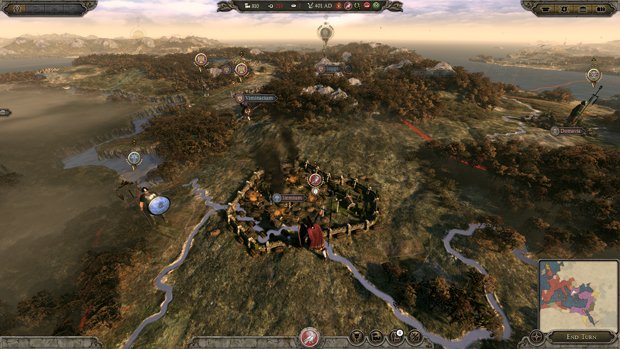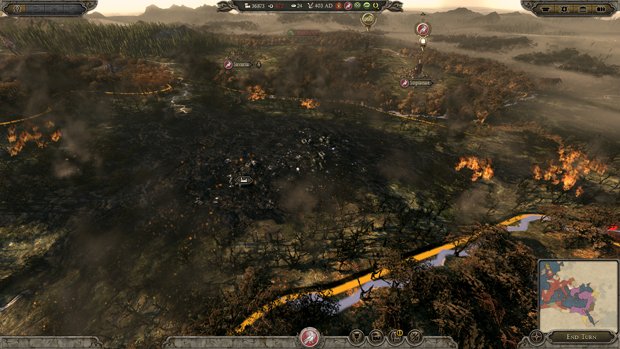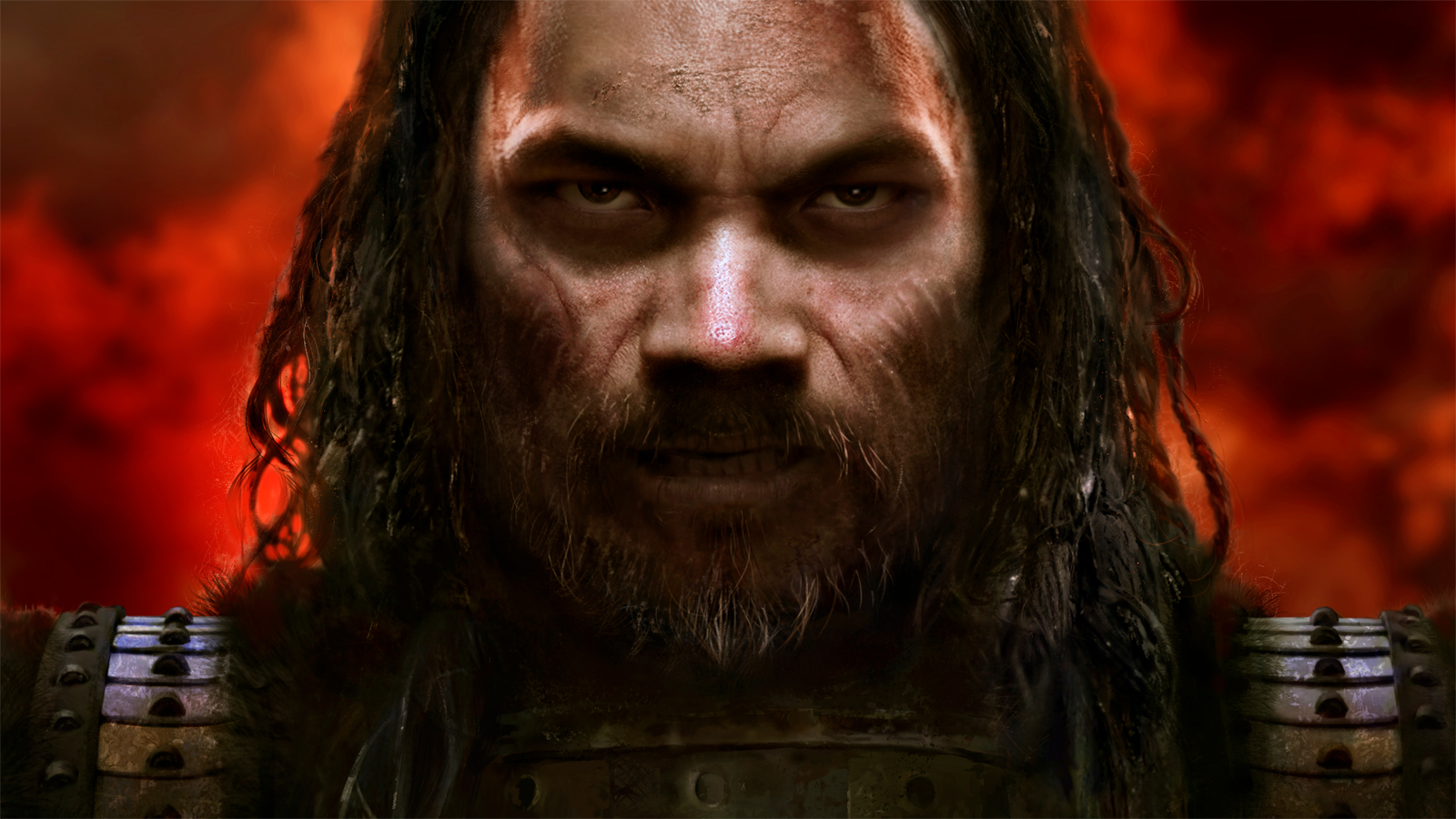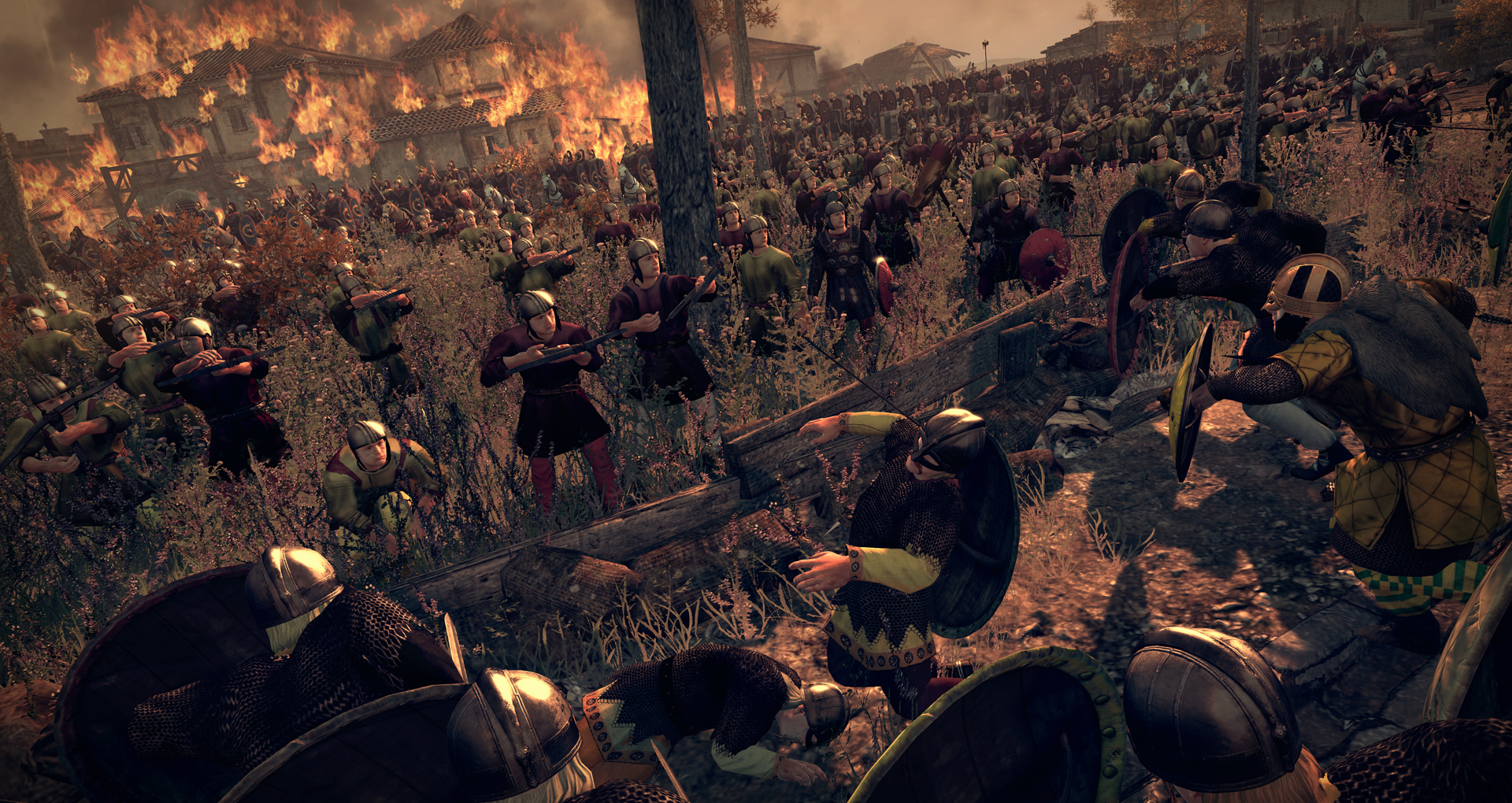GamesRadar+ Verdict
By combining an improved UI with deeper strategic gameplay, Total War: Attila increments on Creative Assembly’s formula to deliver a strategy game (almost) worthy of its namesake.
Pros
- +
High production values
- +
with exceptional music
- +
UI improvements over previous Total War games
- +
Real-time battles are the best theyve ever been
Cons
- -
Long waits for AI turns
- -
Buggy at the moment
Why you can trust GamesRadar+
Attila the Hun was a badass of the highest order. What else can you say about a man who conquered an empire that stretched from Kazakhstan to Germany? Pressure from the Hunnic invasions forced the Franks into France, the Angles into England, and led to the first sacking of Rome in more than 800 years. So if you’re going to create a game centered on a mighty warrior of late antiquity... there’s really only one option, isn’t there?
In the tradition of its forefathers, Total War: Attila mixes a turn-based strategic campaign with thrilling real-time tactical battles. It’s been a winning formula for nearly 15 years, but in this latest installment, Creative Assembly adds a few wrinkles that create one of the better Total War campaigns in recent memory. The most intriguing change rehashes an idea from an expansion to the original Rome: Total War - barbarian cultures can abandon their settlements to form nomadic hordes. In horde mode, armies become mobile towns, gaining the ability to recruit troops on hostile ground at the cost of economic security. Converting your settlements into hordes is a great option if you’re fighting a losing war and need to find greener pastures, but without careful management hordes are likely to splinter into rebellions.

Another addition seems yanked straight out of Crusader Kings 2: a heavy emphasis on political machinations. With Total War: Attila, Creative Assembly offers what is probably the most robust political system in any Total War yet. Individual characters develop over time, and while all share an identical progression tree, each is also given a set of unique personality traits, such as mercantile contacts or bonus morale when in command of an attacking army. Managing these different characters is surprisingly enjoyable, but your leader must strike a balance when intervening in politics - meddle too much, you’ll find yourself with no political influence; leave your underlings to their own devices and they spark a rebellion. The political system can add quite a lot of fun to a game, which is why it’s a damn shame that the interface leaves something to be desired. Creative Assembly doesn’t go out of its way to teach the system to new players, and the interface often leaves out crucial information, meaning players are going to flounder for the first few hours. I got the hang of it eventually, but only after my inept leadership sparked two civil wars.


Though there are several dozen unique factions in the game, a fairly small selection are available to the player without paying for DLC. Each have their own benefits and advantages, so choose your army wisely at the start of the game. Huns, for example, have fearsome cavalry and a strong morale bonus when fighting christians. Saxons, meanwhile, gain bonus income for pillaging and damaging settlements.
The rest of the strategic gameplay is about what you’d expect from a Total War game: satisfying, but nowhere near as tight or well balanced as a ‘real’ 4X title like Civilization 5. To give credit where it’s due, it does look like Creative Assembly has put some work into the AI, meaning computer controlled enemies attack with large armies instead of letting you chop them up piecemeal. Diplomatic AI seems improved as well, with clans suing for peace, negotiating trade agreements, and even marshalling armies to defend their allies’ settlements (something I’ve never seen in a Total War game before). AI has been a rough spot for previous Total War games (looking at you, Empire), and Attila seems like a real improvement.
As enjoyable as the new content and AI are, there are two big issues with Attila’s campaign that need to be mentioned. First, the review build is buggy as hell. At least once an hour, I’d end up staring at a locked screen with no option but giving my PC the three-fingered salute. Second, the turn times are excruciating. I’ve spent as much as three or four minutes watching the AI turn rotate through the long list of clan badges. The average was closer to 2 minutes, but that still feels like an eternity - especially when you’re not sure whether the game will crash before you get to play again. Thankfully, both of these issues are problems that Creative Assembly has traditionally fixed post-launch.
If strategic gameplay is serviceable, the tactical battles are outstanding. Battle speed has been ratcheted back, meaning units no longer break after a few seconds of combat. This is crucial, because it gives commanders enough time to experiment with special abilities or move units into flanking positions. The UI has also received an extensive overhaul, and the new look is a solid compromise between form and function. The changes are far too numerous to list here, but the return of proper unit portraits will delight anyone unhappy with Rome 2’s stylish-but-confusing pottery-art unit cards. It’s actually fairly difficult to find major problems with the tactical battles, except to point out that the review build was just a bit unbalanced. Higher level units never felt much better than their cheaper counterparts, and you’ll find that the rock-paper-scissors of spearmen-swordsmen-cavalry trumps any individual unit’s strength.

If strategic gameplay is serviceable, the tactical battles are outstanding. Battle speed has been ratcheted back, meaning units no longer break after a few seconds of combat. This is crucial, because it gives commanders enough time to experiment with special abilities or move units into flanking positions. The UI has also received an extensive overhaul, and the new look is a solid compromise between form and function. The changes are far too numerous to list here, but the return of proper unit portraits will delight anyone unhappy with Rome 2’s stylish-but-confusing pottery-art unit cards. It’s actually fairly difficult to find major problems with the tactical battles, except to point out that the review build was just a bit unbalanced. Higher level units never felt much better than their cheaper counterparts, and you’ll find that the rock-paper-scissors of spearmen-swordsmen-cavalry trumps any individual unit’s strength.
Normally this is where I’d mention the graphics, but lets be honest: this is a Total War game - the graphics are spectacular if you’ve got a PC that can handle the higher settings. So let’s talk about the brilliant audio design instead. There are many wonderful little touches- a general giving a pre-battle speech, unit actions being signalled by horn blasts - but its the music that really strikes home. Each culture-group has it’s own soundtrack, and each is tailored to that culture’s traditions - germanic factions hear drumming and chanting while steppe cultures are treated to the morin khuur (a type of fiddle) and throat singing. It’s all fantastic, mixing just the right amounts of mystery and aggression to become one of the few game soundtracks I plan to listen to in my spare time. Of course, the voice acting is terrible, but that’s practically a Total War tradition, so I won’t hold it against Attila.
Now then, let’s finally address the war elephant in the room: Is Attila better than Rome 2 was at launch? Absolutely. In fact, many of the additions to Attila seem to be direct responses to the Rome 2 backlash. The AI is smarter. The UI is better. Battles are slow enough that an active commander has time to try effective flanking or misdirection tactics. The list could go on and on, but here’s the thing: Total War: Attila is a damn fine strategy game in its own right, without having to compare it to its oft-lamented predecessor.

More info
| Genre | Real-Time Strategy |
| Description | The latest standalone installment in the superb Total War series sees you taking control of armies in the era of Attila the Hun. |
| Franchise name | Total War |
| UK franchise name | Total War |
| Platform | "PC" |
| Release date | 1 January 1970 (US), 1 January 1970 (UK) |



